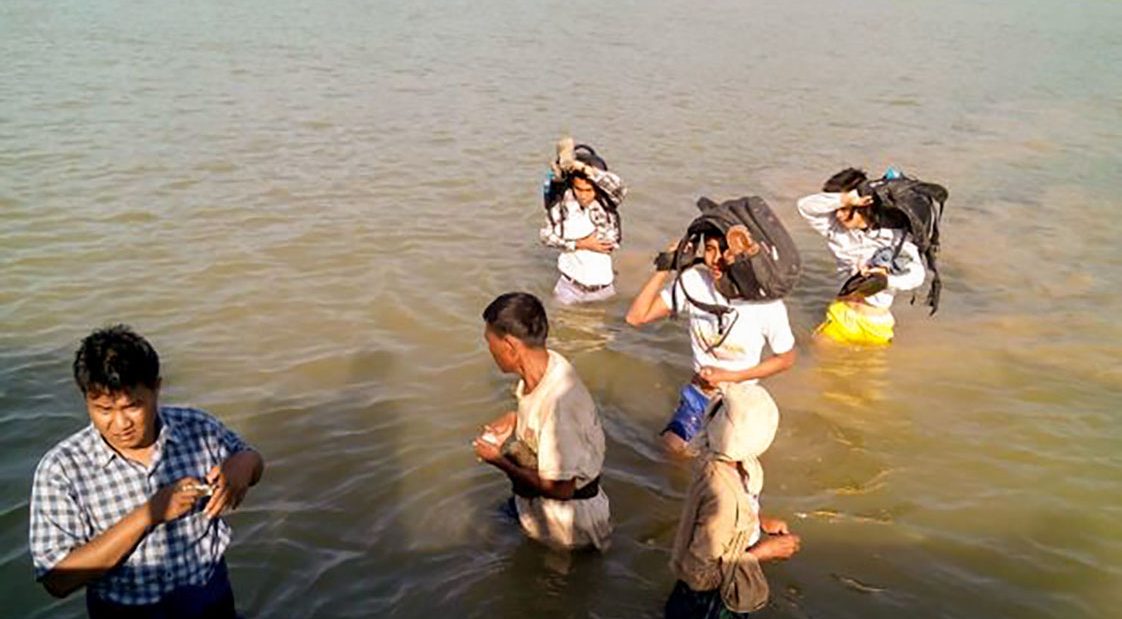Serving the hardest to reach
Intercommunal violence between 2012 and 2017 has led over one million people from an ethnic Muslim minority group to flee their homes in Myanmar’s central and northern Rakhine State. Over 800,000 refugees have now crossed the border to neighboring Bangladesh.
Myebon displacement camp in central Rakhine State shelters 3,000 members of the ethnic Muslim community. The camp is in one of the most remote areas of Myanmar, and is accessed primarily by boat. Relief International is one of only two international organizations working here.
Since 2013, we have supported displaced families who were forced from their homes to a makeshift camp during the civil unrest. Our services to this impoverished community include providing healthcare, protection, and education. We’ve also worked to improve the camp’s water infrastructure.
Relief International continues to offer a range of humanitarian and early recovery services to this highly vulnerable population in Myebon. We are the sole provider of most of these services, with only one other organization working in this setting whose activities are limited to supplying food rations.
Reintegrating a distressed community
Myebon camp is unique and unusual in the context of the Rakhine ethnic violence crisis for several reasons. Firstly, the township was the site of some of the most intense ethnic conflict during the 2012 unrest. Pronounced nationalist sentiment still runs high for the area’s locals, with Myebon’s community groups some of the most active and virulent in Rakhine State.
Secondly, ethnic Muslims who were displaced by the violence in Myebon were moved to a camp located only 500 meters away from their homes, rather than being forced many miles away from their town of origin or across the border to Bangladesh.
Finally and most importantly, Myebon camp has been chosen as one of the first sites for the government of Myanmar’s attempt to dissolve an internally displaced person (IDP) camp and reintegrate the displaced community. It’s a pilot program with very high stakes, and has the potential to serve as a model for other parts of the country if it succeeds.
Relief International has proven expertise in successfully supporting local communities, irrespective of their ethnicity, in Myebon through our projects over the past seven years. This paved the way for us to successfully support and monitor the government’s efforts to design and implement this important reintegration process.
Access to livelihoods for all is key
To achieve successful reintegration for the communities in Myebon, we have developed a three-year initiative that aims to support the authorities in Myanmar to resettle the residents of the camp in a manner that will ensure their freedom of movement, adequate access to livelihoods, and quality public services. To facilitate the project’s objectives and, ultimately, build confidence for replicating the effort elsewhere in Myanmar and beyond, we are building on our well-established relationships with local authorities, civil society organizations, and local ethnic groups and communities in the affected townships.
Our assessment for the project, in collaboration with our government partners, identified livelihood development as the single most important catalyst for social cohesion in this conflict scenario. Our experience in Myebon suggests that, in this extremely remote and resource-poor part of the country, shared economic benefit has the potential to overcome entrenched ethnic grievances.
Relief International’s approach focuses support on forward-looking and diversified off-farm employment and enterprises. The goal is to offer people more viable livelihood opportunities and increase their resilience to environmental, social, and political shocks. The project also works to promote inter-ethnic relations by fostering connections between enterprises, suppliers, and their markets.
Our activities are equally benefiting all affected populations in the township, and bring to scale the existing vocational trainings that have been successfully piloted by Relief International elsewhere in Myanmar in partnership with the authorities.
Furthermore, we will make the learning generated through this pilot resettlement project available to help nurture state and national-level discussions between the government and international community, supporting the development of a camp closure reintegration strategy for Rakhine State.
